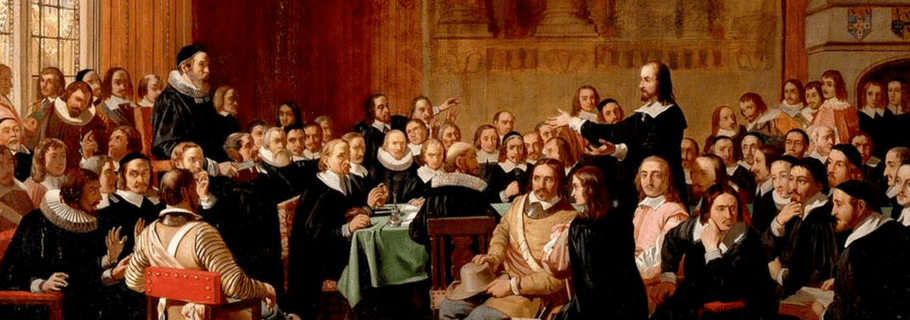Today’s post is written by Justin Holcomb, a theology professor at Reformed Theological Seminary and Gordon-Conwell Theological Seminary, and is sponsored by Zondervan Academic Online Courses.
The Westminster Confession of Faith is a Reformed confession produced in 1646 by the Westminster Assembly in London. Intended to set the doctrinal standards for the Church of England, it became a powerful force in the Church of Scotland and has influenced Presbyterian churches all over the world. Today, numerous churches and denominations worldwide look to the Westminster Confession as their standard of doctrine, subordinate, of course, to Scripture.
Because of its blend of high theology, pastoral matters, and social life, the confession has become important for Christians of many denominations. Ironically, the Westminster Confession of Faith had far more impact outside of the Church of England than within it. The works of the assembly not only became official statements of the Scottish Church but also served as the basis for the foundational theological statements of other English sects and, through them, several other denominations.
Learn more about the historical context of the Westminster Confession:
What the Westminster Confession says
The Westminster Confession of Faith can hardly be boiled down to a single issue. The Westminster Assembly surely saw themselves as doing more than simply repeating a theological system by rote recall. They were engaged in practical matters of extreme import, including the implications of a robust theology on everyday life—such as how to trust in God and how much weight to give the supernatural in major events. In fact, one of the most remarkable aspects of the Westminster Assembly is how a group of theologians labored amid extreme political turmoil to follow a higher calling.
The overall theme of the confession is in understanding how far-reaching the implications of seemingly academic doctrines can be. The Westminster Assembly clearly understood that practice follows teaching, and for the assembly, the theology of the church could not be divorced from the actions of the laity. The confession puts its heart into making the implications of this theology understandable rather than repeating a set of ideas.
Aside from continuing to serve as the theological foundation of several denominations, the all-encompassing nature of this version of Reformed theology stands as perhaps the most enduring aspect of the Confession of Faith and the supporting documents published by the assembly.
The confession is thoroughly concerned with maintaining a conversation with the great creeds of the church that elaborated a robust doctrine of the Trinity (such as that found in the Nicene Creed) and Christ’s nature (such as that found in the Chalcedonian Creed).
The Westminster Standards left practically no aspect of church life (or human life, for that matter) untouched. The biblical and theological thinking that undergirds this system simply cannot be reduced to a single doctrine, as is often tried in much contemporary theological discussion. Specifically, the Westminster Confession does not limit its discussion of predestination merely to a discussion of salvation, nor does it focus on small portions of Scripture to prove its stance.
The attempt to strike some balance between human free will—albeit one corrupted by depravity—and divine sovereignty demonstrates well this desire to incorporate the whole testimony of Scripture.
The assembly’s focus on divine prerogative and gracious activity, highlighted especially by the centrality of the covenant of grace, has often led to this version of Reformed theology being referred to as “the doctrines of grace.” The fine-tuned nature of the confession, due largely to the amount of time taken to craft the document as well as to the large number of theologians involved in the process, has allowed it (and its daughter confessions) to stand the test of time.
Ultimately, the Westminster Assembly succeeded in coordinating its theology within the historically accepted creeds and confessions, separating themselves from the heterodox theologies promulgated throughout Europe and even readily found in the British Isles.
The Westminster Confession’s continuing relevance
Besides setting an example for modern theologians, the confession will help believers broaden their thinking. One of the more jarring aspects of the document is its discussions of everyday life—regulating the Sabbath, for example, which isn’t something many churches spend much time discussing nowadays. The fact is that the confession does open up its readers to seeing Christian life in a more all-encompassing way.
Additionally, the confession gives excellent summaries of the decisions of the major early councils and their importance for Christian life. While the language of the seventeenth century may intimidate some readers, the sections are relatively short and worth the effort to understand God’s providence and the serious implications of living a Christian life. Its tone is that of a theology permeated by divine grace.
For all of these reasons, the Westminster Confession remains relevant as one of the most significant statements of faith for the Protestant tradition.
To learn more about the Westminster Confession, as well as other significant documents from the church’s history, sign up for Know the Creeds and Councils, an online course taught by Justin Holcomb. You’ll explore the Apostles’ Creeds, the Nicene Creed, the Heidelberg Catechism, the Westminster Confession, and many other creeds and confessions.










